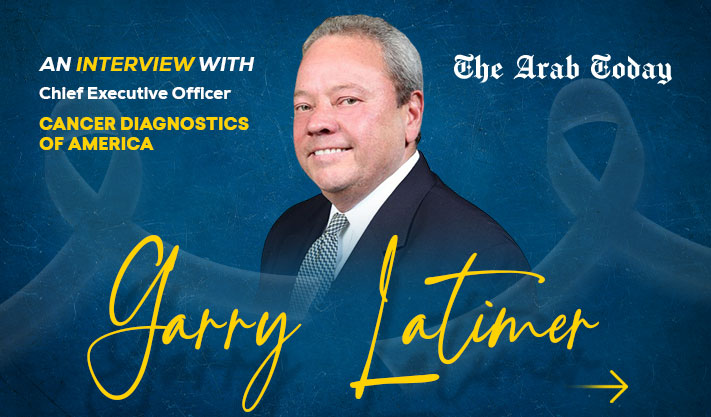R. Garry Latimer Interview
R. Garry Latimer is a seasoned entrepreneur and visionary in the healthcare sector, leading the charge in personalized cancer diagnostics. As CEO of ZYUS Life Sciences, he has introduced the groundbreaking APOP® Assay, a functional test designed to guide oncologists in tailoring treatments for better patient outcomes. With a deep commitment to innovation and compassion, Garry is reshaping how cancer care is approached—one patient at a time.
A Three-Decade Journey in Healthcare
We started the interview by asking, “Garry, you’ve had a remarkable career spanning over three decades in healthcare leadership, from co-founding Laboratory Corporation of America to pioneering cancer diagnostics. How would you summarize your journey and what led you to focus on cancer care innovation?”
R. Garry Latimer replied, “My career has always been about solving problems at scale—whether that meant building clinical laboratory networks, leading turnarounds, or developing new business models in healthcare delivery. Over the years, I’ve worked in senior roles at both startups and Fortune 500 companies, giving me a deep understanding of how to bridge innovation with operational excellence. Cancer became a personal and professional focus when I saw firsthand how outdated our approach to chemotherapy selection was. Too many patients endured ineffective treatments simply because we lacked the tools to personalize therapy. That’s what led me to co-found DiaTech Oncology, develop the APOP® assay, and eventually launch Cancer Diagnostics of America. For me, it’s about combining science, data, and leadership to give patients the best possible chance for survival.”
Addressing the Missing Link in Cancer Care
The Arab Today: What gaps in traditional oncology treatment motivated you to champion functional cancer testing through the APOP® assay?
R. Garry Latimer replied, “For decades, oncology treatment has relied on a “trial-and-error” approach. Patients are often prescribed chemotherapy drugs based on population data, rather than their own cancer’s biology. This means a patient could spend weeks or months enduring toxic side effects from a drug that may not work at all. Having seen this happen far too often, I knew there had to be a better way. The APOP® assay allows us to take live cancer cells from the patient and test them against multiple drugs before treatment begins. This way, oncologists can choose the drug or combination of drugs most likely to kill that patient’s cancer cells. It’s not theory; it’s direct measurement of the tumor’s response. For patients, that can mean starting the right treatment on day one, avoiding ineffective therapies, and ultimately having a better chance at survival and quality of life.”
Redefining Cancer Care
The Arab Today: How does the APOP® assay’s predictive accuracy compare to genomic-only approaches in both clinical outcomes and cost efficiency?
R. Garry Latimer replied, “Genomic testing has been a great step forward in oncology, but it has its limits. Genomics can identify potential drug targets, but it’s essentially making educated predictions. The success rate for genomic-guided chemotherapy is around 20%. By contrast, APOP® directly tests the patient’s own live cancer cells against every chemotherapy option under consideration. It measures how the cells respond in real time, giving us a clear, predictive result that achieves over 80% clinical success. The implications are enormous not just for survival, but also for cost. Chemotherapy drugs in the U.S. can run well over $100,000 annually, and when the wrong drug is chosen, that’s money lost along with precious treatment time. APOP® helps oncologists make the right choice the first time, cutting chemotherapy costs by more than half in many cases. It’s a win for the patient, the healthcare system, and payers who are increasingly focused on value-based outcomes.”
Bringing Disruptive MedTech to Market
The Arab Today: With over 35 years in healthcare operations and mergers, what strategies have you found most effective in bringing disruptive medical technology to market?
R. Garry Latimer replied, “Disruptive medical technology always faces three main hurdles: scientific credibility, clinical adoption, and payer acceptance. My approach has always been to advance these in parallel. First, you must build an irrefutable foundation of clinical evidence peer-reviewed studies, multi-center trials, survival data. Without that, the technology is just an idea. Second, engage respected medical leaders early. When top oncologists validate your science, their peers take notice. Third, align with payer priorities from day one. Too many companies develop breakthrough tools without considering reimbursement strategies until it’s too late. In my experience from co-founding Laboratory Corporation of America to leading DiaTech Oncology the companies that succeed are those that combine rigorous science with a commercial roadmap. With APOP®, we followed this playbook: years of clinical validation, a strong advisory board from NCI cancer centers, and ongoing dialogue with Payors and specifically self-insured employers. The result is a product that’s both medically and economically compelling, ready for broad market adoption.”
Bridging Innovation and Access
The Arab Today: Many groundbreaking diagnostics face reimbursement challenges. How is CDA engaging with payers to accelerate adoption?
R. Garry Latimer replied, “Reimbursement is a critical piece of the puzzle. Even the most effective diagnostic won’t reach patients if payers won’t cover it. At CDA, our strategy is to present hard data that speaks both to clinical and economic outcomes. We have 38 published studies, including 10 peer-reviewed papers, showing APOP® can increase survival by up to 257% in certain cancers while cutting chemotherapy costs by more than 50%. That’s compelling for payers under pressure to control costs without sacrificing quality of care. We’re also exploring value-based care arrangements, where reimbursement is tied to actual patient outcomes. In some cases, we work directly with self-insured employers and healthcare systems who see the direct savings and quality improvements. The goal is to make it financially viable for every stakeholder and always do what is best for the cancer patient. to adopt APOP®. When the data proves both better survival and lower costs, it becomes difficult for payers to ignore.”
The Data That Could Shift Oncologists’ Decisions
The Arab Today: The survival gains in ovarian, leukemia, and breast cancer studies are remarkable. Which clinical data point do you believe will be the biggest tipping point for oncologists?
R. Garry Latimer replied, “Each study tells its own powerful story, but the ovarian cancer data is particularly compelling. In our trials, patients whose treatment was guided by APOP® had a median survival of over 45 months compared to just 25 months for those without it a 68% improvement. That kind of result is hard to overlook in a disease that is notoriously aggressive and difficult to treat. However, the leukemia data showing a 257% increase in survival may ultimately be the clincher for many oncologists. It demonstrates that functional testing can dramatically extend life expectancy in a blood cancer where time is critical. These results are not marginal gains they’re life-changing differences. When oncologists see peer-reviewed evidence that a test can double survival in some cases, it forces a reevaluation of the current standard of care. I believe we’re approaching that tipping point where functional testing becomes impossible to ignore. APOP® has been used in successful tesing for over 50 different cancer typoes.”
Identifying Global Hotspots
The Arab Today: Given your experience in both U.S. and international markets, where do you see the greatest global opportunity for APOP® adoption?
R. Garry Latimer replied, “The U.S. is an important market, but the opportunity for APOP® extends far beyond it. In countries with centralized healthcare systems such as the UK, Canada, and several European nations cost efficiency is a driving force in treatment adoption. APOP® offers not only improved outcomes but significant cost savings, which aligns perfectly with their healthcare models. In emerging markets like India, China, and parts of Southeast Asia, we’re seeing rising cancer incidence combined with an expanding middle class that demands access to advanced care. These regions are leapfrogging some traditional steps in healthcare adoption and are open to innovative solutions that deliver measurable results. Additionally, oncology centers of excellence in the Middle East are investing heavily in precision medicine, making them ideal partners. The combination of proven science, reduced costs, and scalable testing makes APOP® a global solution, not just a U.S.-focused innovation.”
Shaping the Future of Global Cancer Care
Lastly we asked, “Beyond APOP®, what is your long-term vision for integrating functional diagnostics into precision oncology worldwide?”
“My long-term vision is to make functional diagnostics as routine as a biopsy. Right now, we talk about “personalized medicine,” but too often treatments are still chosen based on statistical averages, not individual biology. By integrating live-cell testing alongside genomic profiling and immuino therapy testing, we can truly personalize therapy matching each patient with the drug that has been proven to work for them before they start treatment. This approach not only improves outcomes but also eliminates the wasted time, toxicity, and cost associated with ineffective therapies. Over time, I see functional diagnostics being used not just for chemotherapy, but also for immunotherapy and targeted drugs. Ultimately, my goal is a world where “trial-and-error” cancer treatment is a thing of the past, and every patient begins their journey with a therapy plan that’s both scientifically validated and uniquely theirs. That’s the future I believe precision oncology must and will deliver.
Cancer Diagnostics of America (CDA) and Cancer Diagnostics International is seeking global investment partnerships to develop a US based Training and Testing Center that becomes the foundation for worldwide technology innovation and BEST patient care.” R. Garry Latimer concluded
Connect with R. Garry Latimer on LinkedIn
Contact: garrylatimer@gmail.com and 1+ 615 969 5520
Also Read:
The Remarkable Path of Dr. AFTAB Hasan
A Conversation with Dr. Massimo Bracalé
Mira Abu Moghli Transforming Systems





